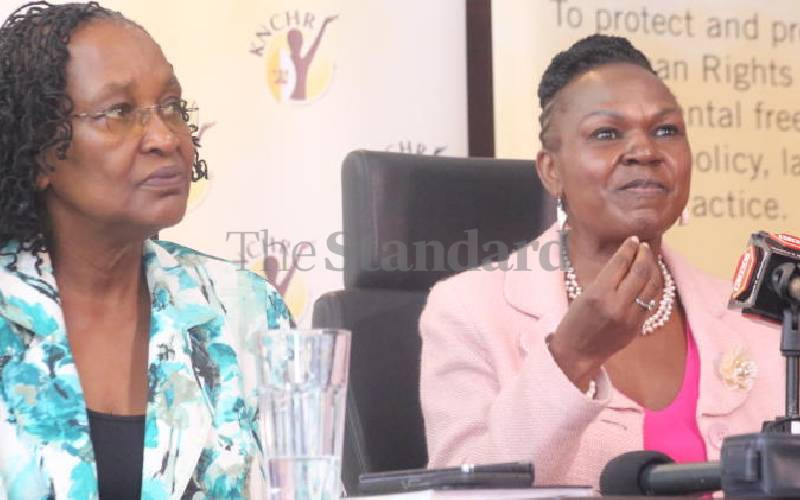By Steve Ouma
Two days ago, the terms of four of the eight Commissioners at the Kenya National Commission on Human Rights (KNCHR) came to an end. For those remaining all but one shall be out of the Commission by end of November 2012.
This marks the sunset of the Commission as constituted by the KNCHR Act, 2002. The promulgation of the new Constitution in August 2010 paved way for the Kenya National Human Rights and Equality Commission (KNHREC) in Article 59(4).
Parliament has since given effect to Article 59 by establishing the KNHREC, The Commission on Administration of Justice (CAJ) and The National Gender and Equity Commission (NGEC). 2012 shall, therefore, be year when the Constitutional KNHREC attains full formation.
As a majority of the Commissioners exit, it is befitting to have a review of the KNCHR and its role in positioning human rights in post-Kanu Kenya. When KNCHR’s first Commissioners took office in July 2003, Kenya was a fragile nation struggling to heal from deep wounds inflicted by years of misrule. The Kanu state was a predator to itself and citizens of Kenya.
Corruption, kleptocracy, intolerance of divergent opinion and misrule had become the modus operandi. Archaic laws and misrule had also undermined relationship between citizens.
It was a state where rights were literally properties of the strong with linkages to state power rather than entitlements of the weak. The culture of impunity that elevated force over law was epitomised by phrases such as utanipeleka wapi and mpende msipende. In the Judiciary, its trademark corruption resulted in the slogan "Why hire a lawyer if you can bribe a judge!"
patrons of impunity
Even the infantile steps made by the Standing Committee on Human Rights that was a precursor to the 2002 KNCHR could not redeem the KANU regime. Indeed, the Standing Committee on Human Rights that was created on May 22, 1996, was more of a ‘regime white wash machine’ rather than a national human rights institution.
The Standing Committee was so captive of the state that it found the genre of human rights promoted by CSOs like Kenya Human Rights Commission, FIDA-K and ICJ oppositional and subversive.
When they took over office under the leadership of Maina Kiai, the first task performed by the KNCHR was to re-position the language of rights from being a subversive language to the official reference script on good governance.
Under this rubric, the 2002 KNCHR used human rights as an instrument of accountability.
Often importing Milton Mayer’s notion of "speaking truth to power", KNCHR has been able to produce a genre of human rights that legitimises the use of human rights language in claims making and asserting citizenship.
Although the Commission has many other ingenious programmes, it is this perspective of rights as a vertical instrument between the governed and the governors that is dominant today.
Florence Jaoko who succeeded Maina as chair and the other commissioners who shall exit in 2012 took forward this same genre of rights. After the post-election violence in 2008, we have seen the Commission offer unambiguous leadership in demand that the perpetrators be held accountable.
Stay informed. Subscribe to our newsletter
It is the effectiveness of the KNCHR in slaying the dragon of impunity that harbours atrocities such as the post-election violence that has seen some patrons of impunity cast aspersions to the objectivity of International Criminal Court.
As KNCHR takes a bow, it has produced a genre of human rights that shall be used for many years under the popular mantra Haki Yetu!
These are irreversible footprints in giving meanings to our democracy. The KNHREC now has both stronger legal foundation through the constitution and a precedent of practice that is truly the pride of many Kenyans.
But this institution must produce yet another variety of human rights. The KNHREC takes office at a time when the crisis of nationhood has deepened in this country.
While some analysts have presented the 2007 election debacle as a constitutional and political crisis, it seems that it is more of a crisis of nationhood.
Many years of misrule entangled with our colonial past that manipulated ethnic affiliations eroded trust amongst Kenyans. The KNHREC must now mobilise human rights as a language or relationship between citizens.
The genre of human rights produced by KNHREC must respond to questions of: Justice for victims of 2007/8 election violence, increasing inequality amongst Kenya, persistence of hate speech and never-ending culture of mob violence. As for the retiring Commissioners, you have fought a good fight, completed the course, and kept the faith.
We thank you.
The writer is the Executive Director Pamoja Trust.
[email protected]
 The Standard Group Plc is a
multi-media organization with investments in media platforms spanning newspaper
print operations, television, radio broadcasting, digital and online services. The
Standard Group is recognized as a leading multi-media house in Kenya with a key
influence in matters of national and international interest.
The Standard Group Plc is a
multi-media organization with investments in media platforms spanning newspaper
print operations, television, radio broadcasting, digital and online services. The
Standard Group is recognized as a leading multi-media house in Kenya with a key
influence in matters of national and international interest.
 The Standard Group Plc is a
multi-media organization with investments in media platforms spanning newspaper
print operations, television, radio broadcasting, digital and online services. The
Standard Group is recognized as a leading multi-media house in Kenya with a key
influence in matters of national and international interest.
The Standard Group Plc is a
multi-media organization with investments in media platforms spanning newspaper
print operations, television, radio broadcasting, digital and online services. The
Standard Group is recognized as a leading multi-media house in Kenya with a key
influence in matters of national and international interest.








